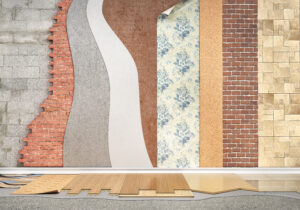10 Questions to Ask While Choosing Floors

*Updated June 26th, 2025
When considering a new floor for your home, it pays to take much more than looks into account. It’s important to consider factors like moisture resistance and durability that can hugely impact the success of your project. Asking the right questions can help you choose the right flooring for your space. Here are 10 questions to ask before buying the flooring that best suits your needs.
1. Is pet-friendliness a priority?
If you’ve got a furry friend running around, that’s definitely something to consider when choosing a flooring type. If you’re looking for superior wear resistance in your floor, then ceramic and porcelain tile, laminate flooring, and vinyl flooring are excellent options. They’re more resistant to scratches than site-finished hardwood and are better suited to withstand wear and tear in active homes.
2. What is your budget?
Taking on a flooring installation project can get expensive quickly. To stay within budget, break down each step – from the flooring material to tools, underlayment, and any finishes. As with any flooring for your home, be aware of hidden costs. And don’t forget to factor in whether you’ll need professional installation or attempt a do-it-yourself installation.
3. Are you going to install the flooring yourself?
If you’re considering a DIY floor project, keep in mind not all flooring options are beginner-friendly. While laminate, vinyl, and carpet tiles are easier to install, materials like solid hardwood flooring or natural stone may require an experienced installer. Be honest about your skills—mistakes can lead to gaps, creaks, or even needing to replace sections altogether.
4. What level of maintenance are you looking for?
Some floors require more upkeep than others. If you’re after low-maintenance flooring, vinyl flooring or laminate are great choices. These are easy to clean, resistant to dirt and debris, and typically only require sweeping and occasional mopping. On the other hand, hardwood floors may need regular polishing and may eventually need to be refinished.
5. What room is it for specifically?
The type of flooring you choose should match the function of the room. For example, a wood floor may look stunning in the living room but may not be the best choice in moisture-prone areas like the bathroom. For a kitchen, consider a surface that’s scratch-resistant and waterproof—tile or vinyl may be the best bet.
6. What are the current flooring trends?
Buying new flooring? Be sure to explore the latest flooring on the market, but don’t sacrifice function for fashion. Neutral tones, natural wood floor looks, cork, and sustainable materials are popular right now. Still, timeless styles like solid wood or hickory remain a smart long-term investment.
7. What is the style and decor of the rooms?
Your new floor should complement your existing interior. Consider how the color, texture, and finish of the floor will complement your overall interior design. Dark hardwood might feel rich and elegant, while light laminate can make small spaces feel larger. Matching trim and thresholds can also create a cohesive look.
8. What is the intended use of the room?
Think about how the room will be used daily. Will people sit on the floor? Will there be frequent spills or heavy foot traffic? Is it a space shared by pets and kids? For high-traffic areas, opt for durable flooring that’s resistant to scratches and dents.
9. How much foot traffic does the room usually receive?
High-traffic areas like entryways and hallways need tougher flooring solutions. If you’re installing a new floor in a busy family room or kitchen, prioritize materials that withstand heavy use, like engineered hardwood, tile, or laminate and vinyl.
10. What is the humidity level of the room?
In humid environments, solid hardwood may warp and buckle over time. Instead, opt for vinyl, laminate, or tile, which are less susceptible to moisture. For basements or bathrooms, a floating floor system over a sealed subfloor may help with moisture resistance and longevity.
Final Thoughts
There are plenty of questions to ask when buying a new floor, and each one helps guide you to the right floor for your home. From understanding flooring type and upkeep to selecting options based on high-traffic areas or indoor air quality, being prepared ensures a smarter purchase.
Whether you go with carpet, laminate, tile, or a classic hardwood floor, the key is to ask before buying new floors. By doing your research and considering the impact of each choice, you can select a flooring material that offers beauty, function, and long-term value.
Additional Flooring Resources
- Top Hardwood Floor Finishes for Your Home
- Top 9 Flooring Trends
- The Ultimate Guide to Protecting Your Hardwood Floors
- Flooring Installation Cost Guide
- What to Expect During Flooring Installation

Anna has over six years of experience in the home services and journalism industries and serves as the Content Manager at MyHomePros.com, specializing in making complex home improvement topics like HVAC, roofing, and plumbing accessible to all. With a bachelor’s degree in journalism from Auburn University, she excels in crafting localized, comprehensive guides that cater to homeowners’ unique needs. Living on both coasts of the United States has equipped her with a distinctive perspective, fueling her passion for turning any house into a cherished home through informed, personalized decision-making.
Connect with top-rated local contractors who can help you with siding, roofing, HVAC, windows, and more. Get free quotes from verified professionals in your area today.








